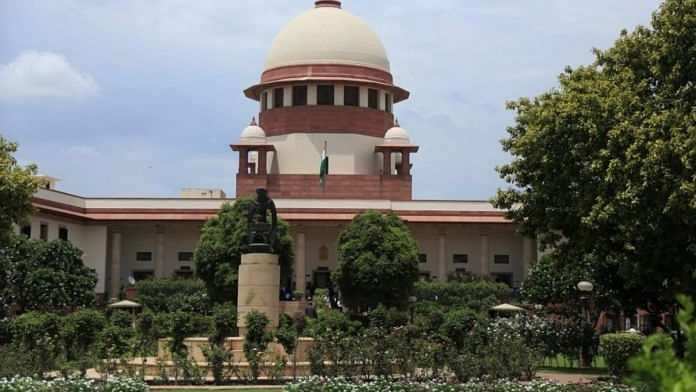New Delhi: It is not the functioning of the Collegium, which recommends appointment of judges for higher courts, but lack of adequate infrastructure and huge vacancies of judicial officers in subordinate courts that is a matter of concern for the judiciary, the Supreme Court said Thursday.
Deliberating on the issue of dealing with a sharp rise in the number of child rape cases, the apex court expressed anguish that judicial officers in places away from the national capital have to work in difficult conditions.
“What are the ground realities in states like Tripura, Odisha and Himachal Pradesh? In states like Madhya Pradesh, they still believe in putting curtains in the court between the accused and the victim,” a bench headed by Chief Justice Ranjan Gogoi said.
The bench, also comprising Justices Deepak Gupta and Aniruddha Bose, said that courtrooms in Delhi district courts like in Saket cannot be compared with those in other parts of the country.
“You may have vulnerable witness room in Saket court here but we are talking about states where we do not have these facilities. We have places where a magistrate sits in a 4 by 4 room. We have seen this and this is the reality of courts,” the bench said.
There are 5,000 vacancies of judicial officers in the country and the legislature comes out with one law after another, the bench said, adding there is a “pumping” of cases on the same judge and various law contemplates that matters should be decided within six months or one year.
“Nobody is looking at the judicial infrastructure,” the bench said, adding that “these are the issues concerning the judiciary and not the collegium of the Supreme Court”.
“We have lost the track,” the bench said.
The bench spoke a line referring to the Collegium as in recent years there has been a lot of criticism over the appointment of judges for the apex court and high courts through the Collegium system in which five and three senior-most judges of the top court recommend the name for appointment of judges for higher judiciary.
The apex court said that Delhi district courts have the best of facilities but in places like in north-east and Odisha, the same facilities are not available and cases under the Protection of Children from Sexual Offences (POCSO) Act are being tried by putting curtains to follow the law which requires that the victim should not be exposed to the accused while recording of his or her statements during the trial.
“In Delhi, you have the best facility. In other parts of the country, like in north-east states, you have a curtain in the court to make separation. This is mockery of justice. We need to have requisite infrastructure for courts,” the bench said.
“States cannot do all these things on its own and we will ensure that the Central government provide all facilities,” the bench said.
At the outset, senior advocate V Giri, who is assisting the court as an amicus curiae in the case titled ‘Alarming rise in the number of reported child rape incidents’, came out with his report on the reasons behind delay in investigation, prosecution and trial in cases under the POCSO.
His report dealt with stages relating to registration of cases under the POCSO Act, its investigation and trial.
Also read: Child rights body doesn’t have any data on sexual abuse cases, SC registrar tells court




I entirely endorse the excellently argued opinion of Mr. Gopal Vaidya. I sincerely hope that those concerned do ponder over his ideas.
Everytime I hear the judges and lawyers speak, it becomes evident how out of touch they are. If, tomorrow, magically the infrastructure was improved and the number of judges increased nothing would change. Judiciary faces a multi-faceted problem. This includes the competence and the quality of judges, the corruption and docket fixing that takes place at all levels, and procedures that haven’t changed in a 100 years. Supreme Court could solve its own backlog simply by refusing to hear the majority of the cases, and the high courts could do the same. Yet, another area of corruption is PILs. It’s an invention that no other country in the world has embraced. It allows judges to indulge in politics and exercise power in ways that they never could – the judges rebellion against the previous CJI was in large part based on the premise that the CJI was not distributing the PILs to the senior judges and thereby depriving them of one the biggest levers of power. There is so much that could be written about our judiciary – poorly written judgments, overly broad judgment, injudicious language, contradictory judgments and the list goes on. These piece meal suggestions suggests that they simply don’t see the big picture of the decrepit state that legal resolution for most cases takes decades.